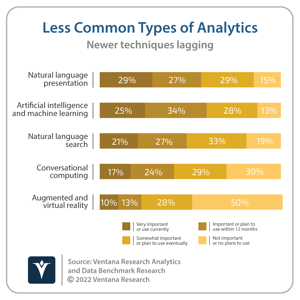Despite all the advances organizations have made with respect to analytics, our most recent research shows the majority of the workforce in the majority of organizations are not using analytics and business intelligence (BI). Less than one-quarter (23%) report that one-half or more of their workforce is using analytics and BI. This is a problem. It means organizations are not enabling their workforce to perform at peak efficiency and effectiveness. It means the workforce in many organizations does not have access to the same information by which they are being measured. It means organizations must find other ways to communicate with, and manage, the workforce.
My theory about why this situation exists is that analytics are hard to use. They require skills that many people do not have. Some organizations believe the way to solve this problem is to raise data literacy in the workforce: educate and train people to have a better-png.png?width=300&name=Ventana_Research_Benchmark_Research_Analytics_04_Pct_of_org_20220112%20(1)-png.png) understanding of data and analytics. Our research shows that training in using analytics may be helpful. Those with better training report better outcomes from their analytics efforts. However, while training may be appropriate as a goal for some personas, I think we can do better for other personas. Rather than train the workforce to do their work in a different, more “data literate” way, why not enhance analytics and adapt them to the way people work?
understanding of data and analytics. Our research shows that training in using analytics may be helpful. Those with better training report better outcomes from their analytics efforts. However, while training may be appropriate as a goal for some personas, I think we can do better for other personas. Rather than train the workforce to do their work in a different, more “data literate” way, why not enhance analytics and adapt them to the way people work?
More than a decade ago, I wrote that BI vendors have been attempting to solve the wrong problem, trying to bring users to BI rather than bringing BI to users. Since that time, satisfaction rates have remained largely unchanged. We reported 37% of participants in our research were satisfied then and in our most recent Analytics and Data Benchmark Research 33% reported they are satisfied now. Sure, expectations are higher now, but technology is also much more powerful. In addition, we have much more data available to analyze and advanced analytics are much more widely available. So, one might expect that satisfaction rates would have risen.
Organizations can increase both the adoption and satisfaction rates for analytics with a two-pronged approach that includes investment in natural language processing and in embedded analytics. It appears that organizations understand the need to embed analytics into operational processes with nearly two-thirds (63%) indicating it is important or very important. However, less than one-third (29%) are using natural language presentation or consider it very important and less than one-quarter (21%) are using natural language search or consider it very important.
operational processes with nearly two-thirds (63%) indicating it is important or very important. However, less than one-third (29%) are using natural language presentation or consider it very important and less than one-quarter (21%) are using natural language search or consider it very important.
Organizations should strive to increase both the satisfaction rates and the adoption rates for analytics. They should consider different measures for different personas. Raising data literacy is valuable for certain personas and will likely increase satisfaction among those individuals. It may not increase adoption much though. To increase adoption, organizations need to take a different approach. They need to consider ways to make analytics more accessible. Embedded analytics and natural language processing are two ways that make analytics more accessible to many of the personas that have been left out in the past.
Regards,
David Menninger


-png.png?width=300&name=Ventana_Research_Benchmark_Research_Analytics_04_Pct_of_org_20220112%20(1)-png.png) understanding of data and analytics. Our research shows that training in using analytics may be helpful. Those with better training report better outcomes from their analytics efforts. However, while training may be appropriate as a goal for some personas, I think we can do better for other personas. Rather than train the workforce to do their work in a different, more “data literate” way, why not enhance analytics and adapt them to the way people work?
understanding of data and analytics. Our research shows that training in using analytics may be helpful. Those with better training report better outcomes from their analytics efforts. However, while training may be appropriate as a goal for some personas, I think we can do better for other personas. Rather than train the workforce to do their work in a different, more “data literate” way, why not enhance analytics and adapt them to the way people work? operational processes with nearly two-thirds (63%) indicating it is important or very important. However, less than one-third (29%) are using natural language presentation or consider it very important and less than one-quarter (21%) are using natural language search or consider it very important.
operational processes with nearly two-thirds (63%) indicating it is important or very important. However, less than one-third (29%) are using natural language presentation or consider it very important and less than one-quarter (21%) are using natural language search or consider it very important.








